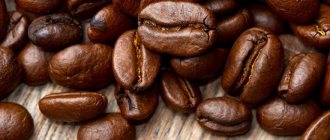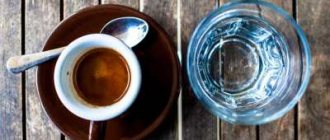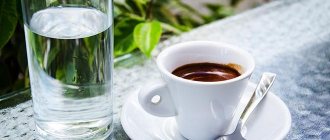It is believed that coffee helps a person wake up and feel alert for several hours. But is it? Many people note that even a large cup of strong drink does not tone their body. Why does coffee make you sleepy? Let's look at the reasons for drowsiness that remains even after a dose of caffeine.
The principle of the effect of coffee on the body
It's not the coffee itself that makes you feel energetic, but the caffeine it contains. It is also found in cocoa, tea leaves, and some types of nuts. But, of course, most of it is found in coffee beans, from which this invigorating drink is usually made.
By the way, its soluble version contains so little caffeine that a person cannot always feel the vigor necessary for him.
Instant coffee is made without the outer shell of the beans, which contain just a lot of the invigorating substance. But precisely because of this, the cost of the drink is reduced by almost half. Natural coffee is created from whole and specially selected beans, so it has a unique effect and incredible taste.
How not to fall asleep after coffee?
Immediately drink a glass of clean water without gas and ventilate the room. It is useful to do a warm-up or walk around the room. Alternate coffee with chicory drinks or freshly squeezed juice. Avoid using granulated coffee.
Stretch your espresso or Americano, do not drink it within 5 minutes. In this case, caffeine will enter the blood gradually and its increased concentration will remain longer.
Count the number of cups of drink you drink every day for a week. If there are more than 4, there is a chance that the body has developed resistance to coffee. Take a break for 1-2 weeks, during which time the receptors will be cleared, and you will again feel energetic after a serving of espresso. During this period, drink tea and herbal infusions with a tonic composition, sleep more and engage in physical activity outdoors more often.
If the situation repeats after each use of coffee, it is recommended to visit a therapist. There may be undiagnosed chronic diseases or the body is under stress.
How does the invigorating drink work?
The human nervous system is very complex. Each of its receptors is responsible for certain processes in the body. And it is adenosine that causes the desire to sleep. When drinking coffee drinks, caffeine, which is very similar in structure to the sleep receptor, replaces it.
As a result, the nervous system simply cannot recognize the correct signal, because its receptors are blocked.
The effect of good coffee lasts up to five to six hours. But it is worth noting that increasing the dosage does not always affect vigor. Three cups a day are enough to feel good.
What effects are observed:
- Loss of sleep and lethargy. As a result, a person begins to think better.
- Blood pressure rises as blood flows faster to the brain.
- The stomach and intestines begin to work more actively, and the person will soon want to eat.
- The kidneys are stimulated, resulting in frequent urination.
- Metabolism improves.
There are many positive qualities of coffee. It is highly effective and is considered a good method for awakening. But in some cases it doesn't help at all.
Why does coffee make you sleepy?
There are several reasons why coffee invigorates or, conversely, puts you to sleep. Direct action has already been described. As for the opposite, this condition can be caused by fatigue of the body, which can no longer respond to caffeine, or by the quality of the product.
Diseases
Normally, coffee stimulates the activity of internal systems, but some conditions can provoke the opposite reaction. Caffeine and theobromine enter the bloodstream during digestion, and only then to the nervous system.
Impaired breakdown and absorption of these substances can cause an overdose or rejection, so the drink should be consumed with extreme caution in the following conditions:
- for diseases of the digestive system - liver, pancreas and gastrointestinal tract;
- for nervous diseases, under stress, sleep disorders, as well as hormonal imbalances;
- in case of coronary heart disease, arrhythmia and angina pectoris, with high blood pressure;
- with renal failure.
For example, liver disease prevents the blood from filtering normally and breaking down active compounds. This means that people with fibrosis, cirrhosis and liver failure need to be content with much smaller doses of caffeine so as not to overload the body, otherwise large doses of the energizing substance will be delivered to the nervous system. Excess theobromine can cause drowsiness.
Another reason is the exhaustion of the adrenal glands, which normally produce adrenaline. If the glands have nothing to release into the blood in response to stimulation by caffeine, the body will only more clearly sense the lack of strength and protest.
In these cases, the stimulant acts on a tired body that does not have the resources for activation. A natural reaction in such a state is the desire to restore strength, that is, to sleep or eat something. Sometimes coffee not only makes you sleepy, but also wakes up a strong appetite.
After illnesses, lack of sleep and stress, it is better to replace coffee with herbal or fruit tea. You should not choose soothing drugs, like chamomile or mint, but neutral and tonic ones, for example, thyme, lemon or currants. A vitamin cocktail will truly give you strength and help you recover.
Stimulant overdose
One of the reasons why caffeine stops activating the body may be an overdose of the substance. On the one hand, there is a threshold for the action of the stimulant: as already mentioned, it is enough to drink 1-2 cups for the drink to act for 4-6 hours. Exceeding this dose will overload the nervous system and liver.
The human body is programmed to maintain balance. When a stimulant is taken in excessive quantities, the body becomes accustomed to its effects and creates compensatory mechanisms. Because of this, you have to increase the portion in order to tone the nervous system, and over time, coffee no longer invigorates.
In such cases, it is necessary to give up the drink for a while. In 2-4 weeks, all receptors will be restored and the “power” of your favorite coffee will again become high.
On the other hand, there is general overwork of the body, when the nervous system does not have enough strength to react to a dose of caffeine with activity. Then the opposite effect occurs - lethargy and lethargy. And an overdose in the form of an extra cup can completely “turn off” the system, just as traffic jams are knocked out when there is an overvoltage in the electrical network.
Then there is no point in drinking one serving after another. It's better to keep sweet coffee and some nuts near your work area and sip a little at a time while supporting your brain with nutritious snacks.
Coffee quality
Finally, the effect of the drink largely depends on its class. Elite grain blends, as a rule, give a pleasant sensation and do not cause discomfort. A low-grade product most often provokes heartburn and has an unpredictable effect on the nerves.
Instant coffee often makes you sleepy because it lacks the caffeine component , but more often than not, such a drink is simply ineffective. Coffee is one of those products that you shouldn’t skimp on to maintain your health, and it’s better to avoid cheap raw materials in favor of herbal tea.
Causes of drowsiness
If you feel sleepy even after a large cup of strong drink, it’s worth understanding the reasons for this loss of strength. They may be as follows.
- Health problems.
- Habit or poor quality coffee.
- Overdose.
Let's look at these reasons in more detail.
Health disorders
If you feel sleepy after just one cup of coffee, you should not put off visiting a doctor. After all, such a violation can indicate various pathologies:
- Poor functioning of the adrenal glands. They are the ones who produce adrenaline, which makes us more alert and energetic. If you drink coffee often, then the functionality of the adrenal glands weakens. They also stop working in case of various diseases. Thus, a person can drink a lot of invigorating liquid, but there will be practically no effect.
- Active work of the Epstein-Bar virus. The herpes virus is present in the body of almost every person. But when he “sleeps”, he is harmless. When activated, the virus depresses the human nervous system, which does not sense active pathogens.
- Liver problems. If liver disease is present, fatigue may be constant. This is why it is so important to see a good doctor.
- Infections and fatigue. All this overloads the nervous system so much that even stimulants cannot help. In this case, you just need a good rest, thanks to which the person can return to normal.
Recharge your batteries
Coffee is one of the popular non-alcoholic drinks. It is valued for its rich aftertaste, characteristic smell and cheerfulness that caffeine provides. This alkaloid blocks adenosine receptors in brain cells, which notify the body of fatigue.
Therefore, after a cup of coffee you don’t feel sleepy, despite your fatigue. For this reason, it is not recommended to drink espresso or espresso-based drinks at night. They act as an energizer, a stimulant, a psychostimulant.
Find out more in the article “Can I drink coffee at night?”
Caffeine overdose as a cause of coffee drowsiness
Not only health problems, a poor-quality drink or habit can cause drowsiness. It turns out that large amounts of caffeine can cause the body to work completely differently than a person expects.
If you drink several cups of invigorating liquid in a short time, the blood vessels in the brain begin to narrow. As a result, oxygen passes less easily to the tissues, and the person himself begins to feel the urge to sleep and becomes lethargic. Sweating, hand tremors, and nausea may also occur.
MORE: Does coffee wash calcium out of the body?
How can you help yourself?
- Ventilate the room and get some fresh air. Do some breathing exercises.
- Make yourself sweet tea, preferably with lemon. This will restore blood flow and nutrition to brain tissue.
- Eat well to improve your condition.
In the future, avoid overdose and make yourself a new portion of coffee no earlier than 2-3 hours after the previous one.
Factors that weaken the effects of caffeine
It happens that a person regularly drinks coffee for a long time, but at some point he begins to notice that his favorite drink no longer evokes the usual feeling of cheerfulness. This means that the body has adapted to the periodic intake of a substance that blocks adenosine receptors and has developed a compensation mechanism. To avoid addiction, you should not increase your daily dose of coffee, but give it up altogether for at least a few weeks. Then, 1-2 days a week, replace coffee with a chicory drink or rooibos.
The invigorating effect of coffee is significantly weakened by milk and cream. Milk protein slows down the absorption of caffeine, and if there is a lot of milk, the effect of the alkaloid is practically neutralized. Therefore, after a cappuccino or latte, a tired person often begins to feel sleepy.
Many people become immune to caffeine after eating high-calorie, fatty foods, including brownies and buttercream cakes. Nature has built into the human body the need to get some sleep after a hearty meal (all predators do this). And the caffeine contained in a cup of espresso is not enough to overcome this physiological need. Also, the invigorating effect of caffeine is weakened if you drink several glasses of water before coffee or eat rich broth or soup.
Coffee with cognac, whiskey or rum causes severe drowsiness. Caffeine and alcohol create a serious load on blood vessels and the liver; the body spends a lot of energy neutralizing the effects of alkaloids, which is why a person feels tired.
Doctors' opinion
According to experts, many people feel sleepy after drinking coffee. There are many reasons for this. But you shouldn’t immediately think about the bad, because one of them could be an individual reaction to caffeine.
Therefore, if a person feels that he is becoming tired after drinking a strong liquid, it is advisable to visit his doctor. By talking about the symptoms and undergoing an examination, he will be able to find out the true cause of his condition. In any case, only an experienced specialist can detect the real source of the problem.
Coffee is an invigorating and tasty drink that should make a person more energetic. But if this does not happen, you must definitely find out the cause of drowsiness.
What to do if coffee makes you sleepy
If coffee drinks cause lethargy, you need to reconsider your diet and lifestyle, and perhaps even consult a doctor. With good general health, drowsiness from drinking coffee can occur only if the body is tired: the person has not had enough sleep or is in a state of chronic stress or illness.
When large doses of the drink cause weakness and lethargy, it is necessary to temporarily abandon it. Warming up, walking in the fresh air or ventilating the room will help awaken the body. If such measures do not help, then the nervous system really needs rest and it’s better to get some sleep.
When you feel sleepy with coffee, you can try one of the options to cheer yourself up:
- switch to tea drinks;
- give up coffee and tea to allow the body to take a break from caffeine and recover;
- move more and breathe fresh air;
- drink clean water to reduce the concentration of active substances in the body.
Caffeine and theobromine also sometimes interact with certain medications, causing drowsiness or insomnia. In such cases, you should consult your doctor or pharmacist. Perhaps they cannot be combined.
How to fall asleep after a nightcap
If coffee causes a rapid heartbeat, trembling hands, increased blood pressure, anxiety, or interferes with sleep, just drink a glass of clean water - this will help cleanse the blood.
Fresh air and a herbal pillow or aromatherapy with soothing oil can also help you fall asleep. Just apply a couple of drops to your wrists and massage your temples.
Coffee and sleep quality are not as closely related as you might think. When the body needs rest, you should not torture it with “magic remedies”. A fragrant drink, first of all, should bring sensual pleasure, and not become a subject of painful addiction. Live in harmony and enjoy delicious coffee recipes.
Is it possible to drink coffee before bed?
You should not drink coffee before bed unless absolutely necessary. This is a tonic drink that can disrupt sleep and wakefulness, cause increased blood pressure and severe headaches. If it is impossible to refuse the drink, it must be made weak and be sure to dilute it with a large amount of milk or cream.
The only case when coffee can be of benefit before bed is if a person has not rested for a long time, but he definitely needs to stay alert. Then a cup of coffee is drunk. And you should go to bed right away. Caffeine will begin to act depending on the characteristics of the body - after 20-40 minutes, this time will be enough for the brain to relax a little.
The person will wake up refreshed and will be able to continue doing his job. This technique is also indispensable for those who often have to be in different time zones. But you should not abuse this coffee drink unnecessarily, as it greatly wears out the body.
Difference between natural and instant types
Caffeine content
Natural grain coffee will save you from drowsiness thanks to 65 mg of caffeine per 100 ml of liquid.
The instant drink is not always invigorating, since 100 ml contains up to 48 mg of caffeine.
An analysis of its composition and production will help you understand why instant coffee makes you sleepy.
Production Features
The coffee bean consists of a core and a shell. The shell contains 70-85% caffeine and 15-30% theobromine. In the core, on the contrary, there are 15-30% caffeine and 70-85% theobromine.
Theobromine is a coffee alkaloid with the opposite properties of caffeine: it calms, relaxes, and puts you to sleep.
To obtain instant coffee, coffee factory workers use the kernel as a raw material. They send the shell to produce medicines and energy drinks that contain caffeine.
Interesting! Why do you serve cold water with coffee?
Therefore, theobromine predominates in soluble granules, sublimate or powder. The drink has more of a sedative effect than an invigorating one.
Invigoration from instant coffee can be obtained in the morning through self-hypnosis, coffee aroma and relaxation during night sleep.
Diseases
Dysfunction of blood purifying organs
The liver and kidneys cleanse the blood of toxins, waste, drugs, and alcohol. To process caffeine, the organs have to work for 3-5 hours.
The kidneys experience additional stress when, under the influence of caffeine, their vessels narrow, and the rest, on the contrary, expand.
If the functioning of these organs is impaired, they will not be able to properly process and eliminate caffeine. The result is a caffeine overdose. Overloaded and diseased organs increase its symptoms. This is how fatigue and the desire to sleep arise.
Stomach and pancreas
Drinks with caffeine increase the acidity of the stomach from 5-7 to 3-4.9 pH for 2-5 hours. This helps digestion if the gastrointestinal tract works smoothly.
For gastritis, colitis, stomach ulcers, and reflux disease, natural coffee can worsen the course of the disease.
Chronic fatigue syndrome
This is a disease that is characterized by prolonged fatigue even with proper rest. The cause of the syndrome is emotional and mental overload to the detriment of physical overload, poor ecology, and the Epstein-Barr virus.
With chronic fatigue syndrome, coffee drinks do not invigorate, but overload the nervous system. Therefore, after them you want to sleep even more.
Hormonal imbalance
When caffeine affects the adrenal glands, they release the hormone adrenaline into the blood. If you drink 5-6 cups of coffee daily, the endocrine glands will begin to wear out and will not be able to work at full capacity.
Therefore, after another cup of drink, instead of an influx of strength and energy, fatigue and drowsiness appear.
How does coffee affect sleep?
Content
The vast majority of people note a surge of vigor and energy after drinking a cup of coffee. This is explained by the fact that the drink contains a large amount of caffeine, a substance that blocks the production of melatonin, the so-called sleep hormone. Therefore, after drinking coffee, after about half an hour, a person begins to notice a surge of strength, drowsiness goes away, and strength appears to perform various tasks.
People who drink little or no drink throughout the day are particularly sensitive to slower melatonin production. It is not recommended for them to drink coffee before bed. The only exception is when you need to work late, but are overcome by drowsiness. In this case, the person will get about a couple of hours of energy to complete all urgent matters. However, you should not overuse this technique, as this may subsequently negatively affect your well-being during the daytime.
When should you not drink coffee before bed?
Coffee before bed should not be consumed in the following cases:
- If a person does not drink it at all, or limits himself to 2 cups of a weak drink per day.
- In the presence of high excitability of the nervous system.
- If you have constant problems falling asleep, your sleep is short, light and superficial.
- For problems with the cardiovascular system, when a person suffers from migraines and regular increases in blood pressure to high levels.
- During adolescence. If you really want, you can replace regular coffee with barley or chicory.
- If you have kidney problems. Coffee is a diuretic, and a diseased organ does not need extra stress.
- People with gastrointestinal diseases need to reduce their drink consumption as much as possible, and not only in the evening. A sour taste can cause increased production of hydrochloric acid, so along with insomnia from overexcitation, severe heartburn will prevent a person from falling asleep.










